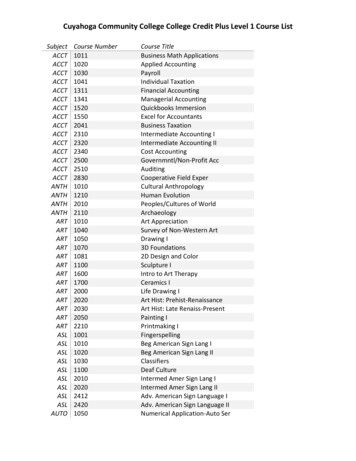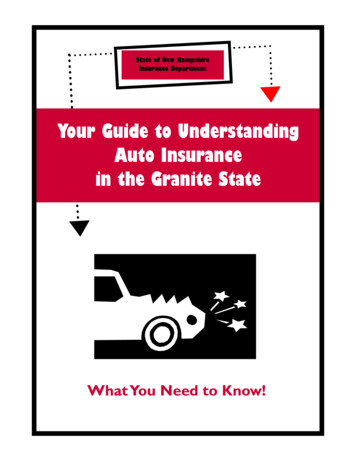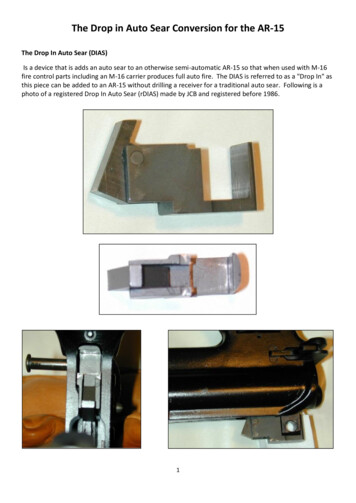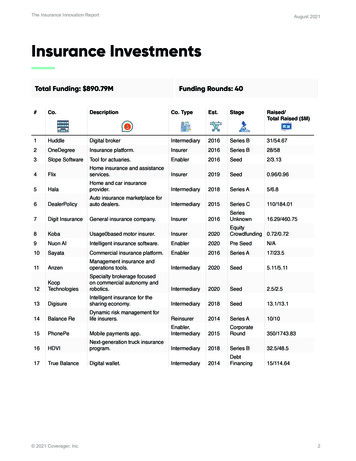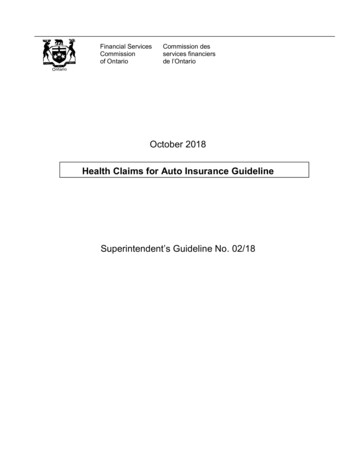
Transcription
Financial ServicesCommissionof OntarioCommission desservices financiersde l’OntarioOctober 2018Health Claims for Auto Insurance GuidelineSuperintendent’s Guideline No. 02/18
Health Claims for Auto Insurance October 2018 GuidelineINTRODUCTIONThis Guideline replaces the Health Claims for Auto Insurance August 2017 Guideline –Superintendent’s Guideline No. 01/17 and is issued pursuant to s. 268.3 (1) of the Insurance Actfor the purposes of ss. 49 (1), 64 (7) and 66 of the Statutory Accident Benefits Schedule –Effective September 1, 2010 (SABS).This Guideline applies to documents specified in this Guideline that are delivered on orafter October 1, 2018, regardless of the date of the accident to which they relate.A document to which this Guideline applies and that previously would have been sent directly toan insurer to whom this Guideline applies, is instead to be sent to a Central Processing Agency(CPA) established by the insurance industry to receive such documents on behalf of insurers.This Guideline describes: which insurers, health care facilities and health care professionals are subject to theGuideline and in what circumstances;what documents are to be delivered to the CPA and in what circumstances;how such documents may be delivered to the CPA;how insurers are to provide information to the CPA; andbilling procedures.Insurers and Participating Facilities That Are Subject To This GuidelineThis Guideline applies only to transactions between Participating Facilities and a ParticipatingInsurer, as defined below, in respect to any claim for SABS benefits under a motor vehicleliability policy issued in Ontario.Specific sections of this Guideline apply where indicated to Service Providers issued a licenceunder s. 288.5(3) of the Insurance Act. Such entities are referred to in this Guideline as “ServiceProviders”. In accordance with s. 288.2(1) of the Insurance Act, an insurer is prohibited frommaking payments directly for listed expenses to a person or entity who does not hold a serviceprovider’s licence at the applicable time.Participating InsurersThis Guideline applies to all insurers licensed in Ontario in respect of all claims for SABSbenefits under any motor vehicle liability policy issued in Ontario. Each such insurer is aParticipating Insurer for the purposes of this Guideline. In addition, for the purposes of thisGuideline the Motor Vehicle Accident Claims Fund is a Participating Insurer.This Guideline does not apply to any reinsurer in respect of claims under a contract ofreinsurance.Superintendent’s Guideline No. 02/18Financial Services Commission of OntarioPage 2
Service ProvidersA Service Provider holds a valid licence issued by the Superintendent of Financial Servicesunder the Insurance Act.Participating FacilitiesFor the purposes of this Guideline, the main office and each specified branch office of a healthcare facility registered with Health Claims for Auto Insurance (HCAI) is a Participating Facility.Each rostered health professional operating on behalf of the main office or a specified branchoffice is a Participating Facility.A Service Provider may be a Participating Facility. A Service Provider may also own one or moreParticipating Facilities. A given Participating Facility may be owned by and licensed as a givenService Provider, or may not be so owned and therefore not part of a Service Provider licence.For greater certainty, a Participating Facility may or may not be a Service Provider.Rostered Health ProfessionalsHealth professionals on the roster of one or more Participating Facilities are Rostered HealthProfessionals for the purposes of this Guideline.Designation of Central Processing Agency – SABS s. 64 (7)Health Claims for Auto Insurance Processing is the CPA for the purposes of this Guidelineand s. 64 (7) of the SABS. Health Claims for Auto Insurance Processing is a not-for-profitOntario corporation established and funded by the insurance industry and operated by a boardof directors that includes representatives of the insurance industry and health care communities.The primary role of the CPA is to act as the agent of insurers to receive specified documents ontheir behalf; to confirm that the documents are duly completed and contain all of the informationrequired to be included in them; and to then make the documents available for access by theinsurers to whom they are addressed. The CPA also acts as an intermediary for the purpose ofenabling insurers to communicate information such as claims approval and payment decisionselectronically to those Rostered Health Professionals and Participating Facilities who wish toreceive such communications electronically through the CPA.The CPA is also expected to be a primary source of the information that automobile insurers willbe required (under s. 101.1 of the Insurance Act) to provide to the Superintendent of FinancialServices, concerning claims for goods and services for which automobile insurers are liableunder contracts of automobile insurance.Public RegistryFSCO will maintain a public registry of current and former Service Providers. The registry can befound on the FSCO website at www.fsco.gov.on.ca. The public registry will include the effectivedates of all licences and will indicate whether any conditions apply to the licence, and whether alicence has been suspended/revoked, or surrendered and the applicable dates.Superintendent’s Guideline No. 02/18Financial Services Commission of OntarioPage 3
INVOICES FOR GOODS AND SERVICES THAT ARE SUBJECT TO THISGUIDELINE – SABS s. 49Any invoice for goods or services specified in Appendix 2 of this Guideline for the purposes of s.49 of the SABS must be in the form (the Auto Insurance Standard Invoice) approved by theSuperintendent of Financial Services in accordance with s. 66 of the SABS and is required to besubmitted through HCAI by a Participating Facility.This requirement applies only if: payment of the invoice is claimed against a Participating Insurer with respect to atransaction with a Participating Facility all of the goods or services referred to in the invoice are provided in Ontario by theParticipating Facility the invoice is submitted by a Participating FacilityWhere this requirement applies, s. 49 (1) of the SABS prohibits a Participating Insurer frompaying any invoice that is not in the approved form, does not include all of the informationrequired by the approved form, or is not sent to the CPA as required by this Guideline. Thisprohibition applies to invoices for services provided by both Service Providers and unlicensedservice providers.Section 49.1 of the SABS sets out additional requirements on when the goods or services areprovided by an unlicensed service provider. After submitting the invoice to the CPA, theParticipating Facility must print off a copy of the invoice, obtain the appropriate signature, andgive it to the insured person. The insured person must in turn send this copy of the invoice to hisor her insurer.DOCUMENTS THAT MUST BE DELIVERED TO THE CPAApplicable FormsThe following documents are specified for the purpose of s. 64 (7) of the SABS. Each of thesedocuments must be delivered to the CPA (and not directly to the insurer) unless otherwisespecified in this Guideline, when delivered by a Participating Facility to a Participating Insurer.Treatment & Assessment Plan (OCF-18) – SABS s. 38The requirement to deliver this document to the CPA applies regardless of whether or not theParticipating Facility is a Service Provider.The OCF-18 is not approved for use with any Minor Injury Guideline (MIG) codes or Preapproved Framework (PAF) codes.Treatment Confirmation Form (OCF-23) – SABS s. 40This requirement applies regardless of whether or not the Participating Facility is a ServiceProvider.Form 1 – Assessment of Attendant Care Needs – SABS s. 42This requirement applies regardless of whether or not the Participating Facility is a ServiceProvider.Superintendent’s Guideline No. 02/18Financial Services Commission of OntarioPage 4
Invoices for attendant care services will continue to be submitted and processed outside of theCPA, using one of the delivery methods provided for in s. 64(2) of the SABSAuto Insurance Standard Invoice (OCF 21) – SABS s. 49The OCF 21 must be submitted to the CPA by all Participating Facilities, including both ServiceProviders and unlicensed service providers, under the circumstances specified in this Guideline,and if this Guideline requires the use of this form for the particular goods or services being billed.Please note that with one exception (see * below), a document that this Guideline does notrequire to be delivered to the CPA must be delivered directly to the insurer using one of thedelivery methods provided for in s. 64(2) of the SABS.Disability Certificate (OCF-3)*An OCF-21 submitted to invoice an insurer only for the completion of an OCF-3 may bedelivered either to the CPA in accordance with this Guideline, or directly to the insurer, at theoption of the Participating Facility.In addition, regardless of whether or not the Participating Facility is a Service Provider, if theParticipating Facility is properly enrolled in HCAI it can continue to submit the OCF-3 in the usualmanner (not through the CPA).Requirements for Submission of the OCF-21The purpose of this section is to set out rules for submission of the OCF-21 that must befollowed by all Participating Facilities. This includes describing the information that must beprovided on the OCF-21 in order for it to be considered to be duly completed and contain allinformation required to be included in it within the meaning of s. 67 of the SABS.An OCF-21 that does not include all required information as identified in the form or required bythis Guideline will be deemed to be incomplete and deemed not to include all the informationrequired by the SABS.Submission of OCF-21 by unlicensed service providersUnlicensed service providers must complete an OCF-21 for all goods and services and submit itto the CPA, even though they will seek direct payment from the claimant. As noted abovesection 49.1 of the SABS requires the unlicensed service provider to provide the claimant with aprinted copy of the OCF-21 that was submitted to the CPA. The claimant will seekreimbursement from a Participating Insurer by sending the copy of the OCF-21 to theParticipating Insurer, as required by s. 49.1 of the SABS. Once the Participating Insurer hasreconciled the printed copy of the OCF-21 with the OCF-21 provided to the CPA, theParticipating Insurer will pay the claimant directly.OCF-21 submissions from an unlicensed service provider are not deemed to have beenreceived by the insurer under subsections 64(8) and (9) of the SABS until the insurer receives apaper copy of the OCF-21 from the claimant. Section 49.1 requires the claimant to send a copyof the OCF-21 to the insurer. Once the insurer receives the copy of the invoice, the receipt datewill be entered into the CPA and the CPA will at that point determine that the document hasbeen duly completed.Superintendent’s Guideline No. 02/18Financial Services Commission of OntarioPage 5
Billing Proceduresa) Frequency of invoicingThis provision only applies to Service Providers.An OCF-21 submitted in respect of a Treatment and Assessment Plan (OCF-18) shall not besubmitted until no further approved goods or services referred to in the OCF-18 will be rendered.However, where the delivery of the goods or services referred to in an OCF-18 extends over 30calendar days, the Service Provider may choose to submit an OCF-21 in respect of that OCF-18not more than once per calendar month.In order to enable insurers to properly reconcile invoices, a Service Provider shall not submit anOCF-21 that applies to more than one OCF-18 or to more than one OCF-23, or to an OCF-18 aswell as an OCF-23.If treatment is being provided under the Minor Injury Guideline (MIG), a Service Provider shallnot submit an OCF-21 in respect of a treatment Block as referred to in the MIG until completionof the Block. (In the event an insured person changes providers while treatment services arebeing delivered, the previous provider may submit an OCF-21 for the services delivered prior tothe change. However, the amount billed must comply with paragraph 6 (“Changing healthpractitioners within this Guideline”) of the MIG.)b) Duplicate invoicesRe-submission of an OCF-21 that refers in whole or in part to goods or services referred to in anOCF-21 already received by the insurer according to s. 64 (9) of the SABS is not permittedthrough the HCAI system. Where a Participating Facility wishes to remind the insurer of anoutstanding amount, the Participating Facility must contact the insurer directly.A Participating Facility who repeatedly and/or deliberately submits duplicate OCF-21 formsthrough the HCAI system may be found by the CPA to be in contravention of the CPA’s userterms & conditions (see HCAI Enrolment below). Such contravention may result in suspension,cancellation or revocation of the Participating Facility’s access to the HCAI system.In addition, a Service Provider is required by section 7 of Ontario Regulation 90/14, ServiceProviders – Standards for Business Systems and Practices (Reg. 90/14) to take reasonablesteps to ensure that it does not submit duplicate versions of OCF 18s, OCF 23s and OCF21s orany other document that is required by this Guideline to be delivered through the HCAI system.It is a condition of every Service Provider licence that Service Providers are required to complywith Reg. 90/14.c) Approved Goods and ServicesParticipating Facilities are to invoice Participating Insurers for goods or services specified inAppendix 2 separately from goods or services not specified in Appendix 2. Similarly,Participating Facilities are to invoice Participating Insurers for goods or services provided inOntario separately from goods and services not provided in Ontario.Superintendent’s Guideline No. 02/18Financial Services Commission of OntarioPage 6
d) Non-approved Goods and ServicesA Participating Facility shall not submit an OCF-21 for goods or services (which includesassessments and examinations) that have not been:i.ii.iii.approved by the insurer,deemed by the SABS to be payable by the insurer, ordetermined to be payable by the insurer on resolution of a dispute in accordancewith ss. 279 to 283 of the Insurance Act.A Participating Facility who repeatedly and/or deliberately submits OCF-21 forms through theHCAI system contrary to this requirement may be found by the CPA to be in contravention of theCPA’s user terms & conditions (see HCAI Enrolment below). Such contravention may result insuspension, cancellation or revocation of the Service Provider’s access to the HCAI system.In addition, a Service Provider is prohibited by section 10 of Ontario Reg. 90/14 from submittingan OCF-21 through the HCAI system for any listed expenses that have not been approved bythe insurer, where approval is required in accordance with the SABS and within the applicabletime limit set out in the SABS. It is a condition of every Service Provider licence that the ServiceProvider is required to comply with Reg. 90/14.e) Use of Appropriate Versions of the OCF-21The OCF-21A and OCF-21B are not approved for the purpose of billing any amounts under theMIG or a PAF.Only the OCF-21C is approved for the purpose of billing any amounts under the MIG or a PAF.When submitting an OCF-21C, the following additional information must be included:i. The date that the treatment Block commenced.ii. The profession(s) of the Rostered Health Professional(s) who provided the treatment.RecordkeepingFor every OCF-21 submitted to a Participating Insurer, the Participating Facility must keep onfile: an original paper version of the OCF-21 as submitted that includes the originalauthorized signature of the regulated health professional providing treatment, oran electronic true copy of the OCF-21 as submitted, provided that it is in pdf format andincludes a true copy of the original authorized signature on behalf of the regulated healthprofessional,and must be prepared to give the insurer access to inspect and copy the OCF-21 in accordancewith s. 46.2 of the SABS where requested by the insurer.Additional Information Required on an OCF-21 Submitted to the CPAa) If it is alleged that the insurer is required to pay for goods or services in accordance withs. 38 (11) of the SABS (i.e., by reason of the insurer’s failure to respond to an OCF-18within 10 business days of receipt) this must be clearly identified in the “OtherInformation” section of the OCF-21.Superintendent’s Guideline No. 02/18Financial Services Commission of OntarioPage 7
b) The “Plan Number” of the OCF-18 or OCF-23 to which the OCF-21 refers must beprovided where indicated in Part 3 of the OCF-21. The “Plan Number” is the uniqueDocument Number generated by the CPA when the OCF-18 or OCF-23 to which theOCF-21 refers was submitted. However, if there is no Plan Number for a reasonpermitted by the SABS or this Guideline, for example because the insurer has waived therequirement for an OCF-18 or OCF-23 under s. 39 or s. 41 of the SABS as applicable,the word “exempt” must be inserted in the Plan Number field and details of thecircumstances must be provided in the “Other Information” section of the OCF-21.c) If the OCF-21 is for goods or services that are alleged not to require an OCF-18because of s. 38 (2) or s. 38 (4) of the SABS, the word “exempt” must be inserted in thePlan Number field in Part 3 of the OCF-21 and details of the basis on which an OCF-18 issaid not to be required must be provided in the “Other Information” section of the OCF21.d) Complete and accurate information regarding other available insurance and health carecoverage must be provided in the “Other Insurance” section of the OCF-21.Completion of DocumentsA document to which this Guideline applies will be deemed not to have been completed and notto contain all the information required by the SABS to be included in it, unless all fields (otherthan those that are optional in the circumstances indicated on the form as approved by theSuperintendent of Financial Services) are completed as required by this Guideline.The information in any completed field must comply with the validation rules set out in Appendix3 of this Guideline.Where the form specifies the format in which certain information (e.g., a date) is to be provided,the information must be provided in that format.All attachments must be legible.Attachments To Documents That Are Subject To This GuidelineFor the purposes of this Guideline, “attachments” means any material (e.g., additional pages,reports, test results) submitted in support of a document to which this Guideline applies.If a Participating Facility determines that it is necessary to send one or more attachments ratherthan including in the document itself all information that the sender determines to be desirable ornecessary to accomplish its purpose, the following special rules apply:1. The sender must specify, in the field provided in the document for that purpose, thatattachments are being sent and the number of attachments being delivered must beentered in the additional comments field.2. The document itself (but not the attachments) must still be delivered to the CPA inelectronic format as described above.3. The attachments are not to be delivered to the CPA, but instead must be delivereddirectly to the insurer by one of the delivery methods described in s. 64 (2) of the SABS.Superintendent’s Guideline No. 02/18Financial Services Commission of OntarioPage 8
Although it is preferable that all attachments be delivered to the insurer at the same time,it is not mandatory to do so.Please note that any attachment delivered to the CPA will be deemed not to havebeen received by the insurer, and will not be returned, but will be destroyed.4. The attachments are not to be sent to the insurer before the document to which thisGuideline applies is sent to the CPA.5. Each attachment must be identified with the claimant’s name, either the claim number orpolicy number, the HCAI document number, the date of the accident, and thedocument type (i.e., OCF-18, OCF-21, OCF-23 or Form 1) to which the attachmentrelates, to enable the insurer to identify the document for which the attachment isintended.RULES GOVERNING DELIVERY OF APPLICABLE DOCUMENTS AND DATEOF RECEIPTDelivery of DocumentsSection 64 (7) of the SABS provides that a document to which this Guideline applies is deemednot to have been delivered to an insurer unless it is delivered to the CPA as required by thisGuideline.Please note that a document that this Guideline does not require to be delivered to the CPA,must be delivered directly to the insurer using one of the delivery methods provided for in s. 64(2) of the SABS.Date of ReceiptSection 64 of the SABS sets out the rules that determine when a document delivered to the CPAas required by this Guideline, is deemed to be received by the insurer to whom it is addressed.Briefly summarized, those rules provide:1. Document with no attachments – is deemed to be received by the insurer to whom it isaddressed when the document has been delivered to the CPA in a manner specified inthis Guideline, and the CPA has determined that the document is duly completed andcontains all information required by the SABS to be included in it.2. Document with attachments – is deemed to be received by the insurer to whom it isaddressed when:(a)the document (exclusive of attachments) has been delivered to the CPA in amanner specified in this Guideline, and the CPA has determined that thedocument is duly completed and contains all information required by the SABSto be included in it; and(b)all of the attachments have been received by the insurer.OCF-21 submissions from an unlicensed service provider are not deemed to have beenreceived in accordance with subsection 64(8) or (9) of the SABS until the insurer receives apaper copy from the claimant as required by s. 49.1.Superintendent’s Guideline No. 02/18Financial Services Commission of OntarioPage 9
The SABS provides (s. 64 (20)) that a document delivered to the CPA by electronic submissionlater than 5:00 p.m. Eastern Time is deemed to have been delivered to the CPA on the followingbusiness day.The SABS also provides (s. 64 (10)) that the CPA will be deemed to have determined, on theday a document was delivered to it in a manner specified in this Guideline, that the document isduly completed and contains all information required by the SABS to be included in it, unless theCPA notifies the sender to the contrary, in a manner specified in this Guideline.For the purposes of s. 64 (10), the manner in which the CPA is to notify the sender is by one ofthe delivery methods provided for in s. 64 (2) of the SABS. The CPA may also deliver thenotification verbally (e.g., by a telephone call or message), provided written confirmation is givenas soon as practicable afterwards by one of the delivery methods provided for in s. 64 (2) of theSABS.As previously noted, the SABS further provides (s. 64 (7)) that a document to which thisGuideline applies is deemed not to have been delivered to an insurer unless it is delivered asrequired by this Guideline. Any document delivered to the CPA by a health care facility that hasnot completed the enrolment process, is not delivered as required by this Guideline andtherefore shall be deemed not to have been delivered to an insurer. Any OCF-21 delivered tothe CPA by an unlicensed service provider is not delivered as required by the Guideline unless acopy of the OCF-21 is given to the claimant and this copy is sent to the insurer.CODES TO BE USED IN SUBMITTING INFORMATIONThe following information shall be provided utilizing the codes specified below: To describe injuries and sequelae, codes listed in the International StatisticalClassification of Diseases and Related Health Problems, 10th Revision, CanadianEnhancement (ICD-10-CA) which is maintained by the Canadian Institute for HealthInformation and available through www.cihi.ca. An abridgment of the ICD-10-CA list ofcodes, developed to assist stakeholders in the Ontario automobile insurance system, isavailable at www.hcaiinfo.ca.To describe health interventions, codes listed in the Canadian Classification of HealthInterventions (CCI) which is maintained by the Canadian Institute for Health Informationand available through www.cihi.ca. An abridgment of the CCI list of codes, developed toassist stakeholders in the Ontario automobile insurance system, is available atwww.hcaiinfo.ca.To describe provider types, the list of Provider Type Codes is available atwww.hcaiinfo.ca.To describe payment categories under a Pre-approved Framework, the list of Preapproved Framework Reimbursement Codes is available at www.hcaiinfo.ca.To describe payment categories under the Minor Injury Guideline, the list of Minor InjuryReimbursement Codes is available at www.hcaiinfo.ca.To describe items billed to automobile insurers by providers that are not covered by theCCI, the list of Goods, Administration, and Other Codes is available at www.hcaiinfo.ca.To describe unit measures and for converting minutes to hours, the list of Unit MeasureCodes and the Minutes to Hour Conversion Table is available at www.hcaiinfo.ca.Superintendent’s Guideline No. 02/18Financial Services Commission of OntarioPage 10
The information at www.hcaiinfo.ca is maintained by Insurance Bureau of Canada in cooperationwith the professional associations referred to at ndex.aspREQUIREMENTS FOR INSURERSAs of December 1, 2014, insurers can only pay Service Providers directly for listed expensesinvoiced on an OCF-21.Prior to releasing payment, insurers are reminded to verify if the Participating Facility isoperating as a Service Provider listed on FSCO’s public registry and that the ParticipatingFacility was licensed on the applicable dates.Where the SABS requires a Participating Insurer to provide information to the CPA, suchinformation shall be delivered to the CPA in electronic form in a manner that results in it beingcapable of being retrieved and accessed by the CPA.The information referred to in s. 49 (3) of the SABS concerning the processing of an invoicemust be provided to the CPA within five business days after the invoice has been processed bythe Participating Insurer.The information referred to in s. 64 (13) of the SABS concerning any other document to whichthis Guideline applies must be provided to the CPA within five business days after the documenthas been processed by the Participating Insurer.The information referred to in s. 64 (14) of the SABS concerning receipt of attachments must beprovided to the CPA within five business days after the last attachment has been received by theParticipating Insurer.The deadlines referred to above are independent of, and not to be confused with, the deadlineswithin which an insurer is to process and respond to a document as set out in the SABS.A Participating Insurer that has completed the enrolment process as an Insurer (see HCAIEnrolment below), is authorized to deliver information to the CPA electronically and to accessfrom the CPA information that has been delivered to the CPA by a Participating Facility.HCAI ENROLMENTBefore submitting information to, or receiving information from the CPA, a Service Provider,health care facility or insurer that is a Participating Facility or Participating Insurer shall enrol withthe CPA and agree to its user terms and conditions. The user terms and conditions may includecommercially reasonable provisions to address responsibilities including confidentiality, security,liability, access, and data integrity.All Participating Facilities are required to: remain in regular contact with the rostered health professionals active on the RosteredHealth Professionals List (even if they are not regular full‐time employees); ensure these individuals know they are, and consent to be, associated with theParticipating Facility; remove Rostered Health Professionals from the Participating Facility’s Rostered HealthProfessionals List, as requested;Superintendent’s Guideline No. 02/18Financial Services Commission of OntarioPage 11
retain a signed Dependent Provider Form or Affiliated Provider Form for each rosteredhealth professional included in your Participating Facility’s Rostered Health ProfessionalsList;within 10 days of an employee leaving the Participating Facility, or upon receiving arequest from a Rostered Health Professional to be removed from the ParticipatingFacility’s Rostered Health Professionals List in HCAI, the Participating Facility mustupdate the Rostered Health Professionals List by adding an end date to the RosteredHealth Professional’s record.TEMPORARY SUSPENSIONS OF THIS GUIDELINEIn the event that the CPA becomes unable (e.g., by reason of temporary technical issues) toproperly carry out its obligations to Participating Facilities or Participating Insurers, theSuperintendent of Financial Services may temporarily suspend the operation of this Guideline.The Financial Services Commission of Ontario will post notice of any suspension andsubsequent resumption of operation of this Guideline on its website (www.fsco.gov.on.ca).During the period of any such suspension, the requirements of this Guideline do not apply anddocuments are instead to be delivered directly to insurers using one of the standard deliverymethods provided for in s. 64 (2) of the SABS.HOW TO DELIVER DOCUMENTS TO THE CENTRAL PROCESSING AGENCYAs required by this Guideline, an OCF-18, 21, 23 and Form 1 to be delivered to the CPA mustbe delivered in electronic format.Electronic SubmissionThe document may be delivered to the CPA in electronic form in a manner that results in it beingcapable of being retrieved and accessed by the CPA.
care facility registered with Health Claims for Auto Insurance (HCAI) is a Participating Facility. Each rostered health professional operating on behalf of the main office or a specified branch office is a Participating Facility. A Service Provider may be a Participating Facility. A Service Provider may also own one or more Participating .

